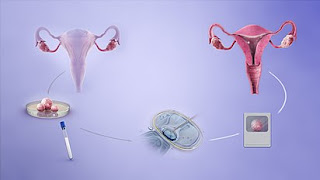Laparoscopy will allow the diagnosis of infertility problems that would otherwise be missed. For example, a woman who has severe endometriosis can be identified by using ultrasound. A woman with mild endometriosis can only be identified using surgery such as laparoscopy.
Another problem that can only be identified through surgery are pelvic adhesions. Also known as scar tissue, adhesions cannot be seen with ultrasound, x-rays or CT scans. Adhesions can interfere with the ability to conceive if they make it more difficult for the egg to get into the fallopian tube at the time of ovulation.
Many people view laparoscopy as less invasive surgery that traditional surgery. Traditional surgery requires making an incision in the abdomen which is several centimeters long. This in turn means that the patient has to spend two to three nights in the hospital. Laparoscopy utilizes one to three smaller incisions. Each incision may be one half a centimeter to a full centimeter in length. Most often, patients who have had a laparoscopy will be able to go home the same day as the surgery. In other words, a hospital stay is not usually required.
Some people believed that laparoscopy would result in less adhesions being formed after reproductive surgery. However, this does not appear to be true.
What are the disadvantages of laparoscopy for infertility?
Laparoscopy requires a different set of skills compared to traditional surgery. In many cases, it can be more challenging to complete a procedure. For example, removing one superficial medium sized fibroid can be accomplished equally well through laparoscopy or traditional surgery. However, a woman that has dozen of fibroids, large and small with some occupying the deep layers of the uterus is much better served with traditional surgery. A good fertility doctor will know when laparoscopy is an advantage and when it is a liability.
Laparoscopy versus IVF
Two commonly encountered problems during a laparoscopy, pelvic adhesions and endometriosis, can also be effectively treated using IVF. Since IVF is less invasive than laparoscopy and has a very high success rate, some couples will opt to skip laparoscopy and proceed directly to IVF. Even if a woman has severe adhesions that are not treated, this would not impact on her ability to conceive a pregnancy with IVF.
Where laparoscopy is having an upper hand, the IVF will be having a lower one as well.
1. Laparoscopy gives chance of natural conception to the lady.
2. Laparoscopy provides information on state of uterus, tubes n pelvis, any preexisting condition leading to tubal blockage like PID, TB, endometriosis, post-surgical adhesions etc
3. Laparoscopy is cheaper
4. Unlike in-vitro fertilisation, medical help is not required for each pregnancy in case of laparoscopy.
Whereas laparoscopy holds these disadvantages:
We can’t treat tubal scarring, can’t confirm tubal functionality via laparoscopy. So tubes may be open but not functional. The risk of tubal pregnancy or ectopic remains if tube partially opened up post laparoscopy.
The success percentage of IVF and laparoscopy:-
There is a 38 percent chance of getting pregnant if you are between the ages of 34 and 40. If you are a female between the ages of 30 and 33, you have a 58 percent chance of getting pregnant after your first IVF cycle.
There are multiple factors which determine the success rate of pregnancy after an endometriosis laparoscopy:-
• Severity of endometriosis
• Type and number of surgeries performed.
• Age
• Ovarian reserve (following surgery, the reduction of ovarian reserve is observed as some primordial follicles may be inadvertently stripped off the ovarian cortex during cystectomy).
• Affected fallopian tubes – impairment of tubal motility/blockage
• Endometrium receptivity
Pregnancy rates after conservative laparoscopic surgery is observed to be about 60% in cases with moderate and 35% in cases with severe disease. High pregnancy rate is observed within the first 6 months of conservative surgery.




















